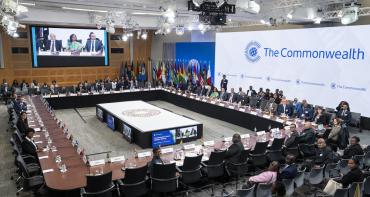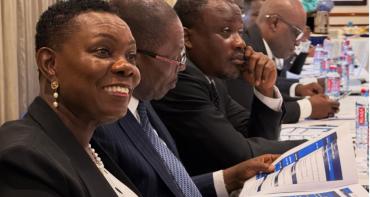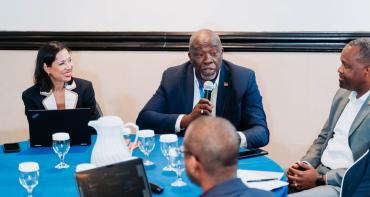Speaker: Commonwealth Secretary-General Kamalesh Sharma
Your Royal Highnesses, Distinguished Delegates, Commonwealth Friends…
Games Contribution to Visibility and Awareness of Commonwealth
For millions of Commonwealth citizens around the world it is the Commonwealth Games that give the most tangible and visible expression to their sense of what it means to belong to our great global family. This makes the Games one of the most important manifestations of the Commonwealth. The thrill of the gathering and the sporting contests appeal to all ages, particularly the young.
It is therefore an immense pleasure to address this Assembly. I am grateful for this opportunity of expressing directly to you the enormous gratitude the Commonwealth owes to Games Associations and to the Federation for the energy and care with which you stage the Commonwealth Games, and the meticulous preparation and planning you undertake in order to deliver competition and spectacle on such a scale, observed avidly throughout the Commonwealth.
Raising global awareness of the Commonwealth, and the values for which it stands, is vital to advancing our collective Commonwealth priorities of democracy, development, and respect for diversity. We applaud the CGF and this Assembly for working to find imaginative and innovative ways by which the Games can enhance the profile of the Commonwealth and bring its citizens more closely together.
Games Reflect Distinctive Character of Commonwealth
The Commonwealth’s distinctive characteristics of affinity, and of respect and understanding, are reflected in the spirit of friendly competition and camaraderie for which the Games are renowned. Cooperation at many levels, inclusivity, and sense of belonging set the Commonwealth apart.
It is important for each generation to explore and gain its own fresh understanding of what the Commonwealth is, what we believe in, and how, by working with those who share our identity as Commonwealth citizens, we can make a difference – locally, nationally and globally.
In 2010, I convened an Eminent Persons Group which delivered recommendations to the 2011 Commonwealth Heads of Government Meeting in Perth. In its report, entitled ‘A Commonwealth of the People’, the Group suggested, ‘the Commonwealth could do more to harness the power of sport toward contributing to the goals of democracy and development through diversity’.
The Group also expressed the hope that greater attention would be paid to the Commonwealth Games as an opportunity for raising the Commonwealth’s profile, both within its member states, and globally.
Participation and Inclusion
The Commonwealth Games display, in many practical ways, the inclusion and equity that are hallmarks of all that we strive for as a Commonwealth. There are moving stories of human determination and fortitude, and outstanding feats of sporting prowess to be witnessed.
Commonwealth citizens in nations and territories around the world watch keenly and supportively as their teams compete. Modern technology beams news and images in coverage that is increasingly accessible and immediate. Hundreds of thousands are able to attend as spectators, and to experience the delight and excitement at first hand.
That sense of participation, whether as a competitor, official, supporter or spectator, is to be treasured. With that in mind I want to pay special tribute to the way in which para-sports for achievers in athletics with a disability are integrated into a fully inclusive sports programme. When introduced at the Manchester Games of 2002 this was a notable first for the Commonwealth among multi-sport events anywhere in the world.
It is by leading the way in such innovation, and by adhering to high principles of sporting engagement, integration and accessibility, that the Commonwealth Games are assured of a distinctive place in an ever more crowded and competitive marketplace.
With your core values and watchwords, ‘humanity, destiny and equality’, you set high standards that enhance performance and perception not only of the Games, but of the Commonwealth itself.
The Games give expression to the web of ties that bind us together. It is woven from cooperation through civil society, professional organisations, local government and parliaments. These links complement the intergovernmental relations that take place when ministers and heads of government meet.
The strengthening of such links within the Commonwealth forms part of the CGF strategic vision, as you advance, Tunku Imran, on the renewal of the vision that you have undertaken, together with CGF Members and the CGF executive, to ensure the Commonwealth Games retain their vibrancy and appeal.
Sport for Development and Peace
Through its ability to both entertain and inspire, sport reaches out in a very special way and to sections of the population that might not otherwise be reached. This gives the Games special potential for fostering Commonwealth values and understanding of the connection between sport and broader human, social and economic development. Sport for Development and Peace can be a crucial element in strengthening community cohesion and relationships, advancing gender equality, inculcating respect towards each other, and building qualities of character, mind, and body.
We therefore do well to continually seek out fresh opportunities to promote links between sport, development and peace. This objective was articulated at the 2011 CHOGM when heads endorsed without reservation the recommendation of the Eminent Persons Group that the CGF should include in its mandate the use and presentation of the Games as an instrument for peace and development.
Heads also endorsed recommendations that the Secretariat should play a coordinating role in supporting Commonwealth member states to develop Sport for Development and Peace initiatives, particularly advancing ‘respect and understanding’, a continuing and important strand of collective Commonwealth core values. Specific reference is made in the Secretariat’s new strategic plan - adopted just last month - for the period 2013-17 to supporting member states in ‘adopting Sport for Development and Peace as an approach to promote values of and strengthen social development’. The Plan also underlines the importance of the intergovernmental Secretariat reaching out and collaborating practically with the non-governmental, such as the CGF.
The Sixth Commonwealth Sports Ministers Meeting, held in London last year, endorsed a framework and key principles for Sport for Development and Peace. These have now been published as the ‘Commonwealth Guide to Advancing Development through Sport’, and I commend that publication to you. It is available from the Commonwealth Secretariat website as a free download, or to buy in hard copy. The framework can be used as a guide for national efforts on Sport for Development and Peace, and I would remind delegates that we have specialist staff attached to the Secretariat who are able to provide technical support.
The Secretariat is committed to continuing and strengthening the fruitful working relationship with the Commonwealth Games Federation. Our mandate in relation to Sport for Development and Peace aligns with the CGF vision which is to ‘develop sport for the benefit of the people, the nations and the territories of the Commonwealth, and thereby strengthen the Commonwealth’.
Integrity of Sport
Distinguished Delegates, I am sure that threats to the integrity of sport are of continuing high concern to you and other sports stakeholders just as they are to our member governments.
At their meeting last year Commonwealth Sports Ministers acknowledged that the growing threat of match-fixing and illegal sports betting was a cross-border issue. Ministers recognised that collaborative action to curb this menace needs to extend beyond the sporting movement and to include legislative bodies, law enforcement agencies and betting providers. They asked CABOS to consider how the Commonwealth can protect the integrity of sport. It is good that, through its membership of CABOS, the CGF is able to contribute to this important work.
In the Commonwealth context, upholding high standards of transparency and fairness in sport speaks, particularly to our youth, of the need for integrity, justice, good governance and level playing fields in all areas of life.
Commonwealth Class
Partnerships become ever more important to the way we work in the Commonwealth. The Secretariat is therefore delighted to be working in co-funded collaboration with the BBC and the British Council on a project linked to the Glasgow 2014 Games. ‘Commonwealth Class’ will use the interest raised by preparations for the 2014 Games as a focus for creating pan-Commonwealth links between children, teachers, and schools throughout the Commonwealth.
Our aim for this global online initiative is to invigorate learning and to bring into the classroom the values of the new Charter of the Commonwealth, signed by Her Majesty The Queen on Commonwealth Day this year. By offering material for school assemblies and printed classroom resource packs for those working with the 7-14 year age group, we hope these values will be given added vitality, taken home and communicated to their friends and their families.
Understanding of the potential of Commonwealth connections at an early age can embed Commonwealth belief and identity, so that it has real meaning for our young people as they move forward through learning and life.
And we have high ambitions. This project can become a striking Commonwealth resource. ‘Commonwealth Class’ is designed to be accessible to all, and education packs and launch events are initially expected to reach approximately 100,000 schools, 300,000 teachers and 17 million young people. It can help to bring together young people and schools around awareness of our shared values, particularly within the context of sport, inspire our youth to high achievement, and deepen their sense of belonging to the Commonwealth family.
The collaboration and pan-Commonwealth cooperation designed into this project is a good example of how, by working together, we are able to achieve more and build on each other’s participation and strengths. It stretches far more widely than simply the three lead partner organisations. It embraces other organisations within the Commonwealth family, and schools and communities in our member states.
The resource packs use material offered by the Commonwealth Education Trust and the Royal Commonwealth Society. The Commonwealth Broadcasting Association will be working to help ensure that public service broadcasters in member states are able to make good use of the special films being produced for this project.
‘Commonwealth Class’, together with other educational projects associated with Glasgow 2104, is building for the future of the Commonwealth. It is designed to establish a continuing legacy. We hope to see the links nurtured and strengthened as we move on beyond Glasgow and prepare for the 2018 Games on the Gold Coast, in Australia.
Glasgow 2014
The next twelve months will be exciting for Glasgow, and for athletes and officials from across the Commonwealth as they prepare to converge on this city. I congratulate Lord Smith and his team at Glasgow 2014 and Commonwealth Games Scotland, the Scottish Government and Glasgow City Council for their successful preparations to this point.
There is a sense of expectancy and we must applaud Glasgow for the strong emphasis being laid on legacy. This sets an admirable pattern for hosts of future Games and other major Commonwealth events.
It is good in this context that we should be aware of the need to work towards a legacy for the Games in those Commonwealth member states that do not themselves have the capacity to host the Games. This is a key area where joining forces with pan-Commonwealth organisations can be of real value and bring lasting benefit.
Many of these member states and territories will join with mounting fervour in preparations for Glasgow 2014 as they see the Queen’s Baton Relay arrive in their midst.
We look forward to welcoming the Queen’s Baton Relay to Marlborough House at the very beginning of its long journey around the globe. The Baton will come to our Commonwealth headquarters immediately after it has been sent on its way from the forecourt of Buckingham Palace by The Queen as Head of the Commonwealth.
This demonstrates with most fitting symbolism the importance of the Games to the whole Commonwealth family at every level. I look forward to strengthened and ever more dynamic collaboration between the Secretariat, the Games Federation, the Commonwealth Games Associations and the entire Commonwealth family.
I thank you once again, Tunku Imran, for inviting me to address this Assembly. I thank everyone present for their efforts on behalf of the Commonwealth and for the benefit of our citizens. I look forward to working with you all over coming months and years – and to coming back to Glasgow and seeing many of you again in July next year.



